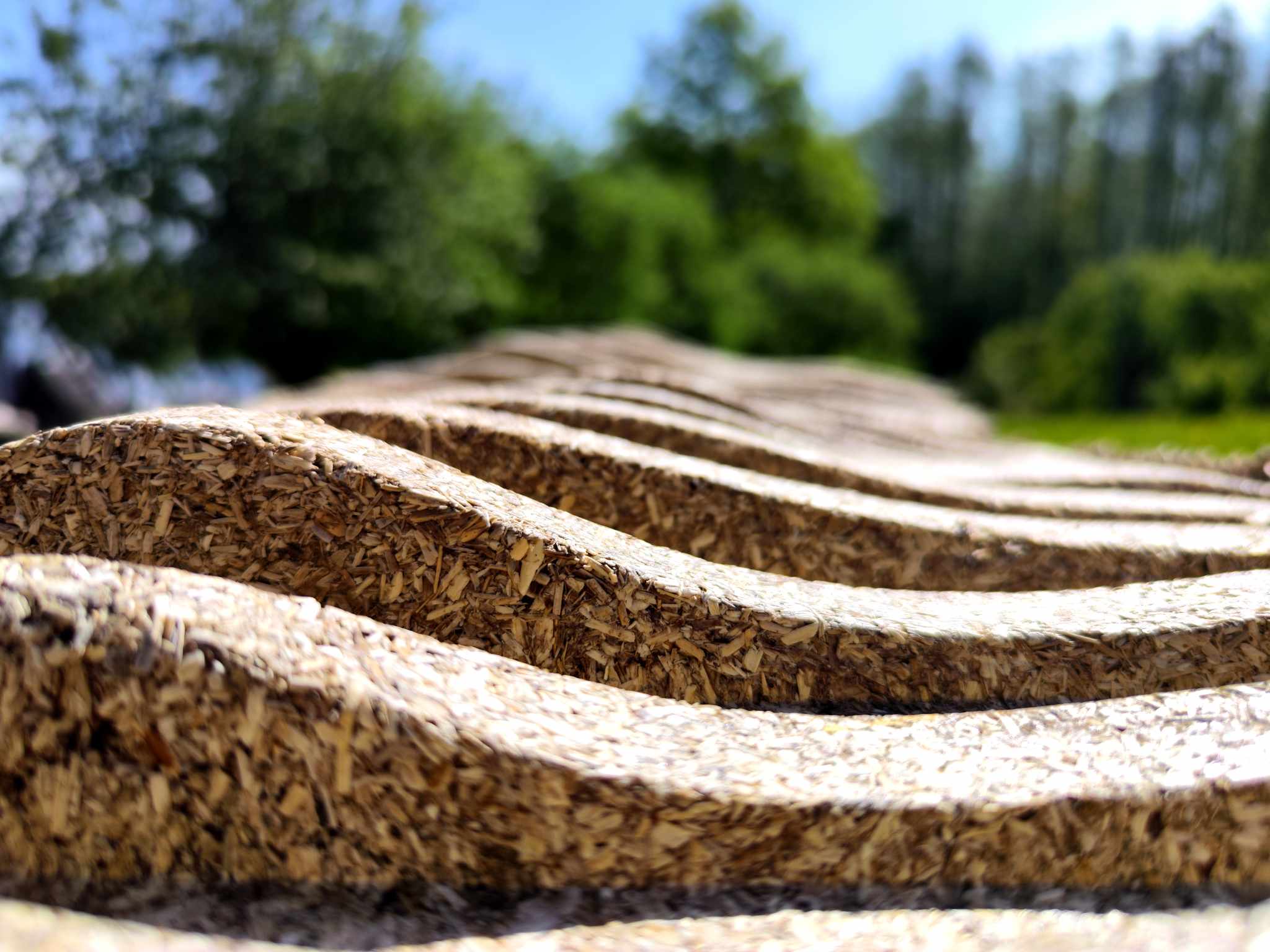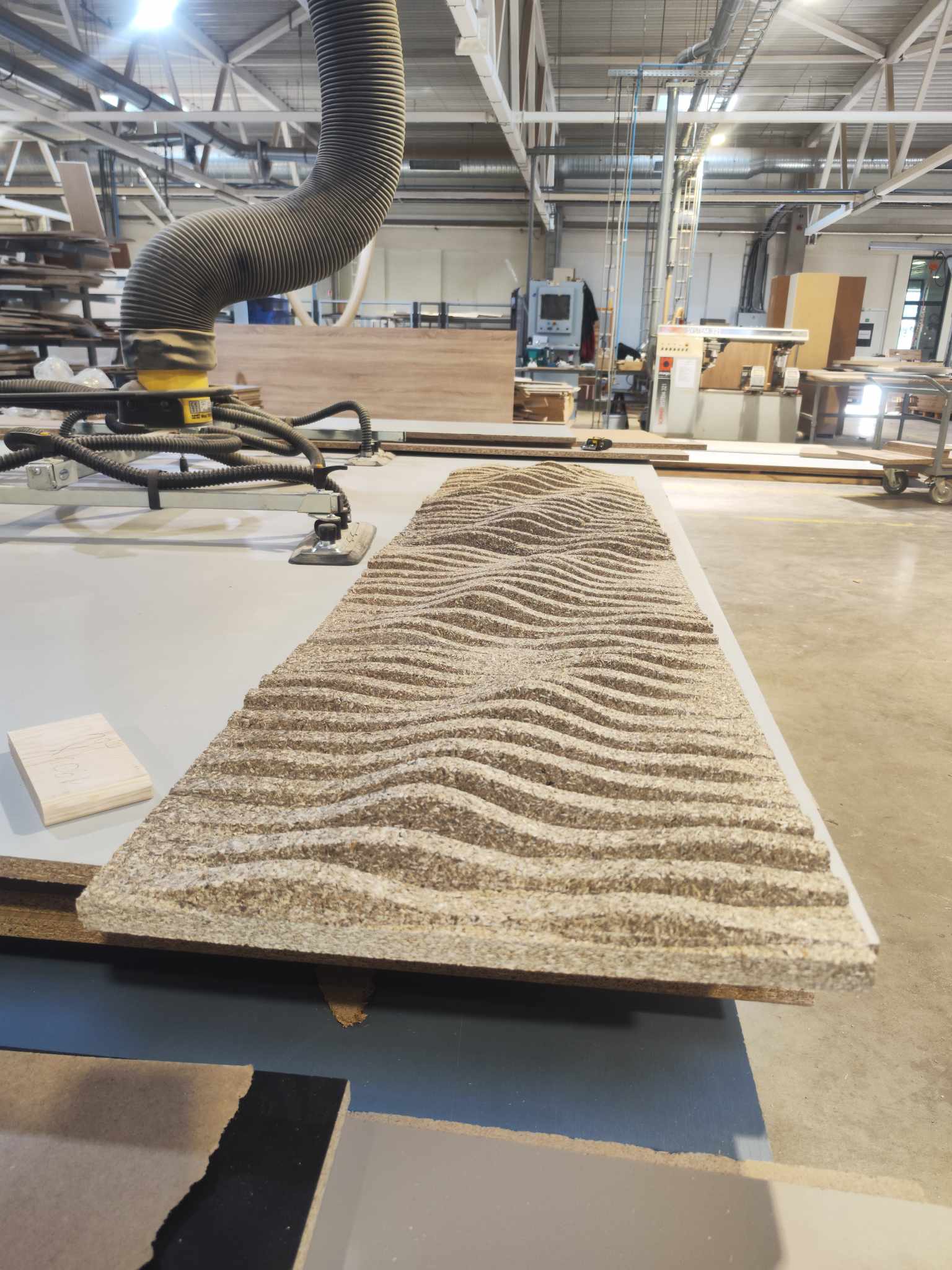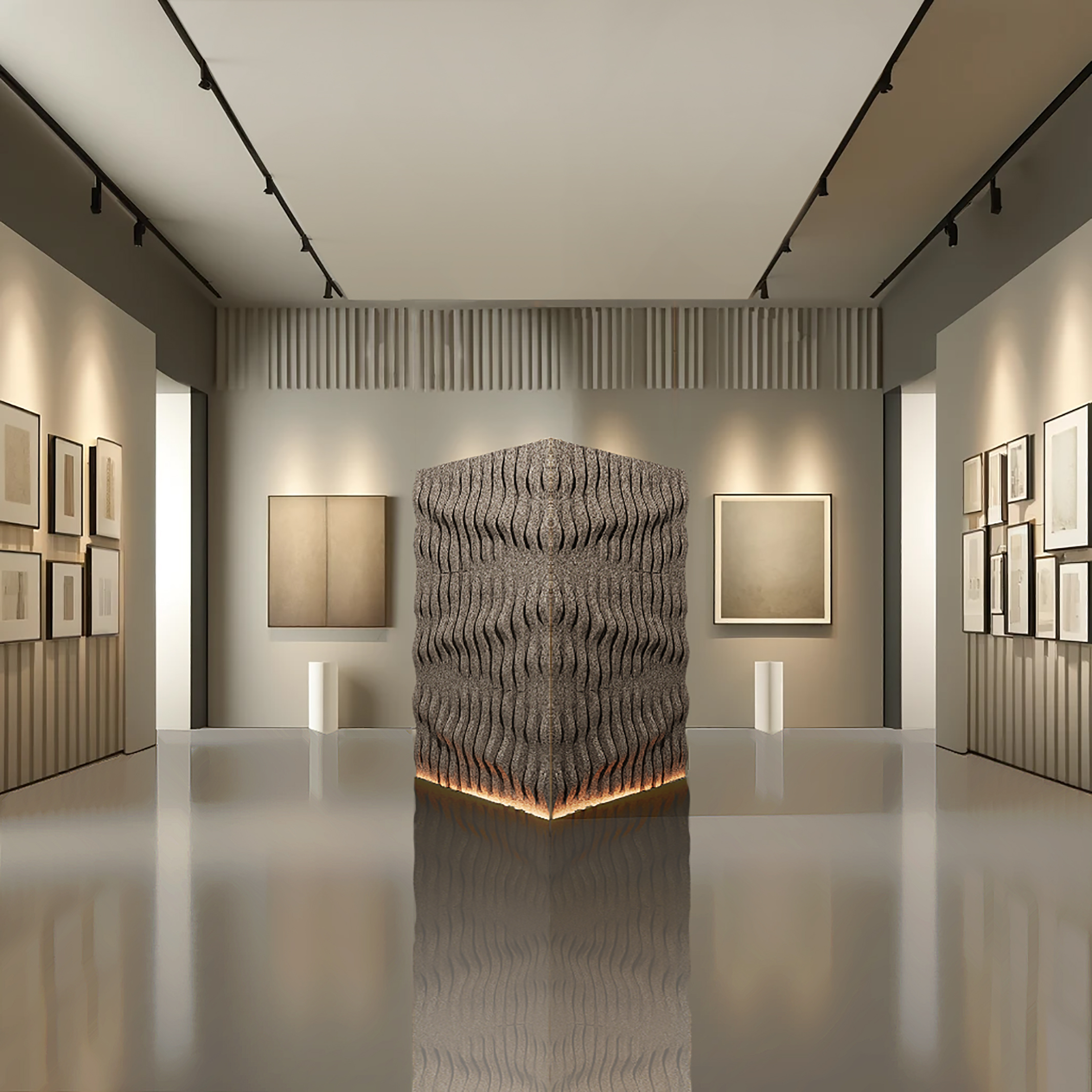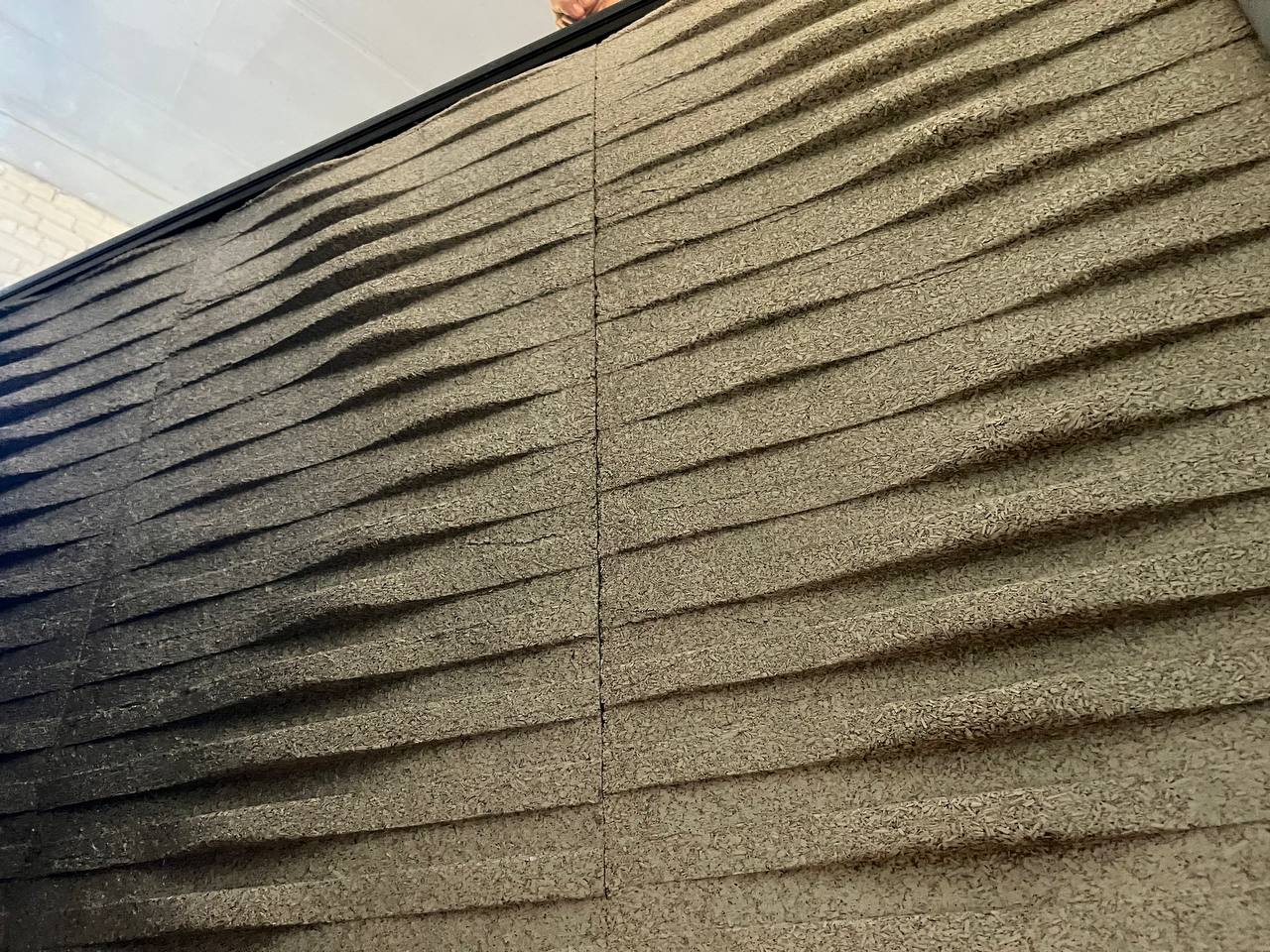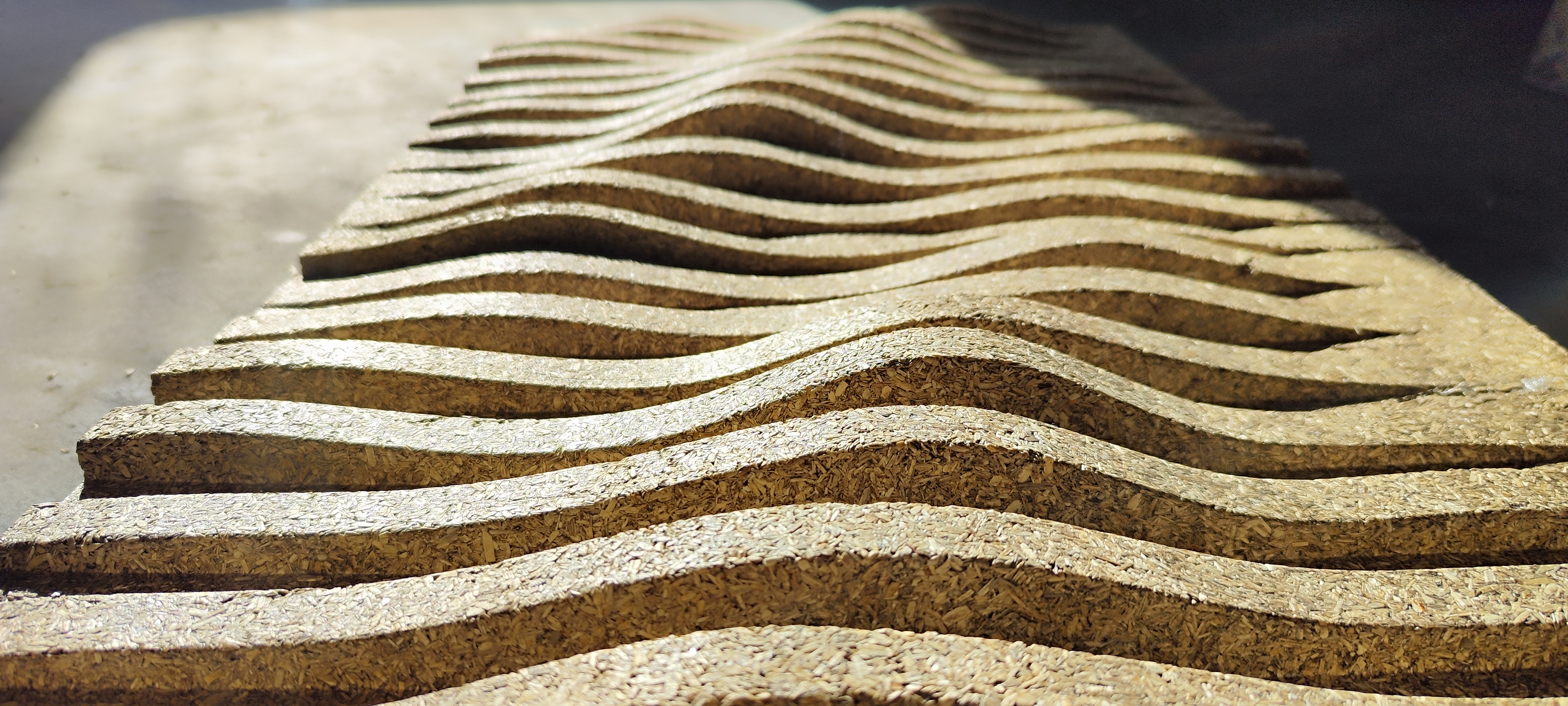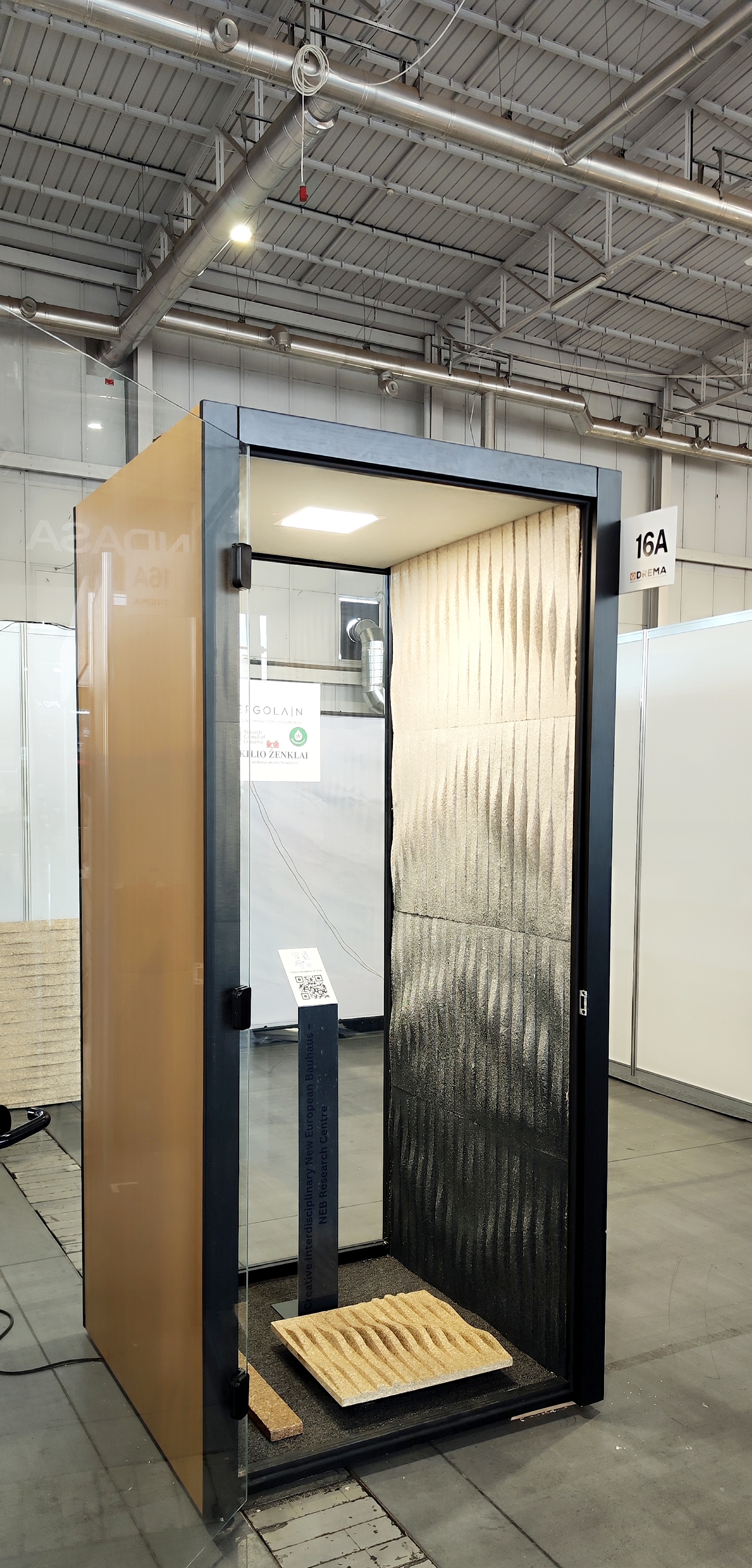Shaping a circular industrial ecosystem and supporting life-cycle thinking
HempForma
Hemp acoustic panels for sustainable design
The project transforms locally grown hemp into eco-friendly acoustic panels, offering a zero-waste, CO₂-reducing alternative to conventional materials. By reviving Lithuania’s centuries-old hemp industry, supporting local farmers, and reducing deforestation, we are shaping a circular economy while creating beautiful, sustainable, and functional spaces for residential, public, and commercial use, considering the sustainable design principles of the New European Bauhaus (NEB).
Lithuania
National
It addresses urban-rural linkages
It refers to a physical transformation of the built environment (hard investment)
Yes
2024-09-19
No
No
Yes
Yes
Yes
As a representative of an organisation
This project develops sustainable, hemp-based acoustic panels that integrate circular economy principles, biomaterial innovation, and inclusive design to address global environmental and social challenges. Targeting architects, designers, public and private sector stakeholders, the project offers an eco-friendly alternative to conventional acoustic materials. By utilizing carbon-negative hemp shives and fibers, sourced from local Lithuanian and Ukrainian farmers, the initiative strengthens regional economies, supports war-affected Ukrainian agriculture, and reduces reliance on deforestation-prone wood products—a pressing issue in Lithuania, where illegal logging and large-scale wood processing industries impact forest preservation. Through bio-inspired parametric design, informed by the sound-absorbing properties of Ural Owl feathers, the panels provide high-performance acoustic solutions for residential, public, and commercial spaces, including sensory-friendly environments for neurodivergent individuals. The project aligns with New European Bauhaus (NEB) values, emphasizing sustainability, inclusion, and aesthetics while promoting zero-waste manufacturing and biodegradable materials. It fosters interdisciplinary collaboration between Vilnius Academy of Arts NED research center (VAA), Vilnius Gediminas Technical University (VILNIUS TECH), and Kaunas University of Technology (KTU), ensuring scientific validation and industrial applicability. Recognized in international exhibitions and attracting interest from European sustainable design networks, the project serves as a scalable model for sustainable material production, tackling climate change, biodiversity loss, and social inequality through localized, nature-based solutions that enhance the quality of life for communities.
Circular economy & life-cycle thinking
Zero waste & sustainable materials to reduce CO₂ footprint
Local agriculture & hemp cultivation
Reconnecting with nature through design for a healthier environment
Versatile application in residential, public, and commercial spaces, prioritizing those in need
This project exemplifies sustainability by integrating circular economy principles, carbon-negative materials, and resource-efficient production to create innovative acoustic panels. Hemp shives and fibers, the primary materials used, are rapidly renewable, biodegradable, and require minimal water and no synthetic fertilizers or pesticides, making them a highly sustainable alternative to conventional acoustic materials like mineral wool or PET felt. Hemp is also one of the most CO₂-absorbing plants, actively contributing to carbon sequestration and reducing the environmental footprint of building materials.
The project follows a zero-waste approach, ensuring that all production by-products are either reused, composted, or recycled. The panels are designed for full biodegradability, eliminating waste accumulation at the end of their life cycle. By sourcing hemp from local Lithuanian farmers and Ukrainian producers, the project strengthens regional supply chains, reduces CO₂ emissions from transportation, and revives a historic hemp industry that was disrupted during the Soviet occupation.
Beyond material innovation, the project incorporates energy-efficient production methods, requiring lower energy inputs compared to synthetic alternatives. Additionally, the panels contribute to healthier indoor environments by improving air quality and naturally regulating humidity.
By combining sustainable agriculture, responsible material sourcing, and eco-design, this initiative serves as a scalable and replicable model for sustainable construction and interior design. It demonstrates how bio-based, circular materials can replace conventional high-carbon alternatives, aligning with the New European Bauhaus (NEB) vision of a greener, more sustainable future.
The project follows a zero-waste approach, ensuring that all production by-products are either reused, composted, or recycled. The panels are designed for full biodegradability, eliminating waste accumulation at the end of their life cycle. By sourcing hemp from local Lithuanian farmers and Ukrainian producers, the project strengthens regional supply chains, reduces CO₂ emissions from transportation, and revives a historic hemp industry that was disrupted during the Soviet occupation.
Beyond material innovation, the project incorporates energy-efficient production methods, requiring lower energy inputs compared to synthetic alternatives. Additionally, the panels contribute to healthier indoor environments by improving air quality and naturally regulating humidity.
By combining sustainable agriculture, responsible material sourcing, and eco-design, this initiative serves as a scalable and replicable model for sustainable construction and interior design. It demonstrates how bio-based, circular materials can replace conventional high-carbon alternatives, aligning with the New European Bauhaus (NEB) vision of a greener, more sustainable future.
The project merges aesthetics, functionality, and cultural heritage by drawing inspiration from nature—specifically, the Ural Owl (Strix uralensis), a species known for its near-silent flight due to specialized sound-absorbing feathers. During the research phase, I discovered a deceased Ural Owl at the edge of a hemp farm, an event that resonated deeply with childhood memories of hearing its calls and seeing its silhouette against my great-grandparents' well cover. This emotional connection led to the development of an acoustic panel design inspired by the owl’s natural ability to dampen sound.
By analyzing the microstructure of owl feathers, I developed initial sketches that evolved into a refined 3D modular construction. The panel's geometry, informed by mechanical engineering data and parametric design methods, optimizes sound absorption while maintaining visual harmony. The result is a design that not only enhances acoustic quality in residential, public, and commercial spaces but also fosters a deeper connection with nature.
Culturally, the project revitalizes Lithuania’s historical relationship with hemp, a material deeply embedded in local traditions but disrupted by Soviet occupation. By incorporating hemp-based acoustic panels into contemporary architecture and interior design, the project bridges past and present, reconnecting people with their heritage while promoting sustainable, locally sourced materials.
As an exemplary model, this project demonstrates how biomimicry and cultural narratives can shape aesthetically compelling and functionally superior design solutions. It aligns with the principles of the New European Bauhaus (NEB) by fostering sustainability, inclusivity, and a renewed sense of belonging through innovative material applications.
By analyzing the microstructure of owl feathers, I developed initial sketches that evolved into a refined 3D modular construction. The panel's geometry, informed by mechanical engineering data and parametric design methods, optimizes sound absorption while maintaining visual harmony. The result is a design that not only enhances acoustic quality in residential, public, and commercial spaces but also fosters a deeper connection with nature.
Culturally, the project revitalizes Lithuania’s historical relationship with hemp, a material deeply embedded in local traditions but disrupted by Soviet occupation. By incorporating hemp-based acoustic panels into contemporary architecture and interior design, the project bridges past and present, reconnecting people with their heritage while promoting sustainable, locally sourced materials.
As an exemplary model, this project demonstrates how biomimicry and cultural narratives can shape aesthetically compelling and functionally superior design solutions. It aligns with the principles of the New European Bauhaus (NEB) by fostering sustainability, inclusivity, and a renewed sense of belonging through innovative material applications.
This project prioritizes inclusion by ensuring accessibility, affordability, and adaptability in acoustic design while fostering social and economic resilience. Designed for universal application, the panels can be used in residential, public, and commercial spaces as wall and ceiling coverings, acoustic furniture, or freestanding objects. Their modularity allows flexible integration into diverse environments, making sustainable acoustic solutions more affordable and widely accessible.
A key focus is creating sensory-friendly spaces to support neurodivergent individuals, such as those with autism or ADHD, who often experience sensory overload. The sensory cube, developed as part of this project, provides a cost-effective, adaptable intervention to reduce anxiety, enhance self-regulation, and improve cognitive well-being for children. By addressing the needs of individuals who require controlled sensory environments, the project contributes to a more inclusive and neurodivergent-friendly society.
Social inclusion is also reflected in the project’s collaborative economic model. By engaging local Lithuanian hemp farmers, it revives a traditional hemp industry, strengthening regional economic independence. Additionally, in response to the war, the project has partnered with Ukrainian hemp farmers, enabling them to export hemp shives for panel production. This collaboration provides economic opportunities for Ukrainian farmers while fostering cross-border resilience and cooperation.
The project also exemplifies transdisciplinary inclusion by integrating expertise from scientists, designers, engineers, and architects through collaborations with Vilnius Gediminas Technical University (VILNIUS TECH) and Kaunas University of Technology (KTU).
A key focus is creating sensory-friendly spaces to support neurodivergent individuals, such as those with autism or ADHD, who often experience sensory overload. The sensory cube, developed as part of this project, provides a cost-effective, adaptable intervention to reduce anxiety, enhance self-regulation, and improve cognitive well-being for children. By addressing the needs of individuals who require controlled sensory environments, the project contributes to a more inclusive and neurodivergent-friendly society.
Social inclusion is also reflected in the project’s collaborative economic model. By engaging local Lithuanian hemp farmers, it revives a traditional hemp industry, strengthening regional economic independence. Additionally, in response to the war, the project has partnered with Ukrainian hemp farmers, enabling them to export hemp shives for panel production. This collaboration provides economic opportunities for Ukrainian farmers while fostering cross-border resilience and cooperation.
The project also exemplifies transdisciplinary inclusion by integrating expertise from scientists, designers, engineers, and architects through collaborations with Vilnius Gediminas Technical University (VILNIUS TECH) and Kaunas University of Technology (KTU).
This project embodies the three core working principles of the NEB—participatory processes, multi-level engagement, and a transdisciplinary approach—by actively involving citizens, local communities, and industry professionals in its development and implementation. At the local level, Lithuanian hemp farmers and craftsmen have played a key role in cultivating, processing, and refining hemp materials, ensuring that traditional knowledge is preserved while supporting sustainable rural economies. Local communities were engaged in hemp harvesting, fostering a sense of ownership and raising awareness of sustainable agriculture.
At the regional and national levels, the project collaborates with universities and research institutions. Scientists, designers, and engineers from these institutions contributed expertise in biomaterials, parametric design, and acoustic engineering, ensuring the panels meet both aesthetic and performance standards. The project has also engaged civil society organizations, designers, and architects through workshops, exhibitions, and discussions on sustainable material innovation, broadening its impact within the design industries.
At the European level, the project fosters cross-border cooperation by partnering with Ukrainian hemp producers, allowing them to export hemp shives to Lithuania despite the challenges of war. This initiative supports Ukrainian agriculture, strengthens regional economic resilience, and reinforces European solidarity through sustainable industry collaboration.
Through these participatory efforts, the project has created an inclusive, community-driven model that not only develops innovative acoustic solutions but also empowers local economies, promotes environmental responsibility, and sets a precedent for sustainable material production across Europe.
At the regional and national levels, the project collaborates with universities and research institutions. Scientists, designers, and engineers from these institutions contributed expertise in biomaterials, parametric design, and acoustic engineering, ensuring the panels meet both aesthetic and performance standards. The project has also engaged civil society organizations, designers, and architects through workshops, exhibitions, and discussions on sustainable material innovation, broadening its impact within the design industries.
At the European level, the project fosters cross-border cooperation by partnering with Ukrainian hemp producers, allowing them to export hemp shives to Lithuania despite the challenges of war. This initiative supports Ukrainian agriculture, strengthens regional economic resilience, and reinforces European solidarity through sustainable industry collaboration.
Through these participatory efforts, the project has created an inclusive, community-driven model that not only develops innovative acoustic solutions but also empowers local economies, promotes environmental responsibility, and sets a precedent for sustainable material production across Europe.
The project engages stakeholders at multiple levels—local, regional, national, and European—ensuring a comprehensive approach to sustainability and circular economy principles.
At the local level, collaboration with Lithuanian hemp farmers helps revive the hemp industry, strengthening rural economies and promoting sustainable agriculture. Local craftsmen contribute their expertise in hemp material processing, while community involvement in hemp harvesting fosters engagement and cultural continuity.
At the regional level, partnerships with Vilnius Gediminas Technical University (VILNIUS TECH), Kaunas University of Technology (KTU), and Vilnius Academy of Arts NEB research center support biomechanical research, parametric design, and biomaterial development. This interdisciplinary collaboration ensures the panels meet high acoustic and environmental standards while integrating scientific research into sustainable design innovation.
At the national level, the project aligns with Lithuania’s circular economy goals, offering hemp-based materials as a sustainable alternative to deforestation-prone resources. With one of Europe’s largest IKEA wood factories, Lithuania faces illegal logging challenges, making alternative bio-based materials a crucial solution for reducing environmental impact.
At the European level, the project partners with Ukrainian hemp farmers, enabling them to export hemp shives to Lithuania despite wartime disruptions. This strengthens international trade, economic resilience, and sustainable material sourcing.
By integrating stakeholders across disciplines and regions, the project serves as a scalable model for sustainable material production.
At the local level, collaboration with Lithuanian hemp farmers helps revive the hemp industry, strengthening rural economies and promoting sustainable agriculture. Local craftsmen contribute their expertise in hemp material processing, while community involvement in hemp harvesting fosters engagement and cultural continuity.
At the regional level, partnerships with Vilnius Gediminas Technical University (VILNIUS TECH), Kaunas University of Technology (KTU), and Vilnius Academy of Arts NEB research center support biomechanical research, parametric design, and biomaterial development. This interdisciplinary collaboration ensures the panels meet high acoustic and environmental standards while integrating scientific research into sustainable design innovation.
At the national level, the project aligns with Lithuania’s circular economy goals, offering hemp-based materials as a sustainable alternative to deforestation-prone resources. With one of Europe’s largest IKEA wood factories, Lithuania faces illegal logging challenges, making alternative bio-based materials a crucial solution for reducing environmental impact.
At the European level, the project partners with Ukrainian hemp farmers, enabling them to export hemp shives to Lithuania despite wartime disruptions. This strengthens international trade, economic resilience, and sustainable material sourcing.
By integrating stakeholders across disciplines and regions, the project serves as a scalable model for sustainable material production.
The project integrates multiple disciplines, ensuring a holistic approach to sustainable acoustic panel design. The collaboration between experts in biomaterials, architecture, engineering, acoustics, and environmental science has been fundamental in achieving innovative, high-performance solutions aligned with New European Bauhaus principles.
Material science and biomaterials: together with NEB researchers from Vilnius Academy of Arts I explored biodegradable and renewable materials, developing hemp-based composite panels. This work involved testing different fiber compositions to enhance structural integrity, durability, and acoustic properties.
Architecture and design: applied parametric design, optimizing the panels' 3D modular structure for both aesthetic and functional performance.
Acoustic engineering: scientists from VILNIUS TECH contributed sound absorption testing and mechanical engineering analysis, ensuring the panels meet industry standards for noise reduction in residential, public, and commercial spaces.
Environmental science and circular economy: the project emphasizes life-cycle thinking by integrating zero-waste principles, local hemp farming, and carbon-negative materials. Experts in sustainability assessment provided carbon footprint evaluations, reinforcing the project's climate-positive impact.
The interdisciplinary collaboration allowed for the exchange of knowledge across fields, resulting in a functional, sustainable, and aesthetically refined product.
Material science and biomaterials: together with NEB researchers from Vilnius Academy of Arts I explored biodegradable and renewable materials, developing hemp-based composite panels. This work involved testing different fiber compositions to enhance structural integrity, durability, and acoustic properties.
Architecture and design: applied parametric design, optimizing the panels' 3D modular structure for both aesthetic and functional performance.
Acoustic engineering: scientists from VILNIUS TECH contributed sound absorption testing and mechanical engineering analysis, ensuring the panels meet industry standards for noise reduction in residential, public, and commercial spaces.
Environmental science and circular economy: the project emphasizes life-cycle thinking by integrating zero-waste principles, local hemp farming, and carbon-negative materials. Experts in sustainability assessment provided carbon footprint evaluations, reinforcing the project's climate-positive impact.
The interdisciplinary collaboration allowed for the exchange of knowledge across fields, resulting in a functional, sustainable, and aesthetically refined product.
This project introduces an innovative approach to acoustic panel design by integrating sustainable biomaterials, circular economy principles, and bio-inspired design strategies, setting it apart from mainstream practices. Unlike conventional acoustic solutions that rely on synthetic foams, mineral wool, or PET felt—materials with high embodied carbon and limited recyclability—this project utilizes hemp hurds and fibers, a rapidly renewable, biodegradable, and carbon-negative material.
Beyond material innovation, the project incorporates bio-inspired design principles, drawing from the unique sound-absorbing properties of Ural Owl feathers. By applying parametric and algorithmic design methods, the panel structures are optimized for both acoustic performance and aesthetic value, demonstrating a nature-based, scientifically informed approach rarely seen in mainstream acoustic solutions. Additionally, the project expands the functionality of acoustic materials by creating a versatile product adaptable for various applications, including wall and ceiling panels, furniture, and freestanding sound-absorbing objects. A key focus has been the development of sensory-friendly designs tailored for neurodivergent individuals, particularly those with autism or ADHD, offering an adaptive solution to enhance well-being in different environments.
This initiative also stands out for its strong regional and international collaboration. The project not only revitalizes Lithuania’s traditional hemp industry but also actively supports Ukraine during the ongoing war by collaborating with Ukrainian hemp producers. By enabling them to export hemp shives to Lithuania, the initiative provides economic stability and sustains agricultural livelihoods in a time of crisis. This cross-border partnership strengthens regional resilience, fosters European solidarity, and demonstrates how sustainable industries can offer tangible support in times of geopolitical instability.
Beyond material innovation, the project incorporates bio-inspired design principles, drawing from the unique sound-absorbing properties of Ural Owl feathers. By applying parametric and algorithmic design methods, the panel structures are optimized for both acoustic performance and aesthetic value, demonstrating a nature-based, scientifically informed approach rarely seen in mainstream acoustic solutions. Additionally, the project expands the functionality of acoustic materials by creating a versatile product adaptable for various applications, including wall and ceiling panels, furniture, and freestanding sound-absorbing objects. A key focus has been the development of sensory-friendly designs tailored for neurodivergent individuals, particularly those with autism or ADHD, offering an adaptive solution to enhance well-being in different environments.
This initiative also stands out for its strong regional and international collaboration. The project not only revitalizes Lithuania’s traditional hemp industry but also actively supports Ukraine during the ongoing war by collaborating with Ukrainian hemp producers. By enabling them to export hemp shives to Lithuania, the initiative provides economic stability and sustains agricultural livelihoods in a time of crisis. This cross-border partnership strengthens regional resilience, fosters European solidarity, and demonstrates how sustainable industries can offer tangible support in times of geopolitical instability.
Material research a development – the project explores hemp shives and fibers as a sustainable alternative to conventional acoustic materials. In collaboration with researchers experiment with biodegradable and renewable composites, optimizing fiber composition for structural integrity, durability, and acoustic properties.
Parametric and bio-inspired design – drawing inspiration from Ural owl feathers, the project applies parametric and algorithmic design methods to develop 3D modular acoustic panels. This allows for optimized sound absorption, adaptability, and aesthetic value, ensuring functional and visual harmony in interior spaces.
Acoustic and mechanical testing – scientists conduct sound absorption testing and mechanical performance analysis, ensuring that the panels meet industry standards for noise reduction. This research-driven validation supports the development of high-performance, eco-friendly materials.
Circular economy and zero waste implementation – the project adopts a closed-loop production system, ensuring full recyclability and biodegradability of the panels. By integrating local hemp farming and regional supply chains, it minimizes transportation-related CO₂ emissions while supporting sustainable agriculture.
Inclusive and sensory-friendly design – the project incorporates universal design principles by developing adaptive acoustic solutions for various applications, including walls, ceilings, furniture, and freestanding objects. A particular focus has been placed on sensory-friendly solutions for neurodivergent individuals, in collaboration with the Lithuanian music therapy association and Autism-Friendly organization.
Community and stakeholder engagement – the methodology prioritizes multi-level collaboration.
The project bridges scientific research, sustainable manufacturing, and social inclusion, ensuring a scalable, transferable, and replicable model for eco-friendly acoustic design.
Parametric and bio-inspired design – drawing inspiration from Ural owl feathers, the project applies parametric and algorithmic design methods to develop 3D modular acoustic panels. This allows for optimized sound absorption, adaptability, and aesthetic value, ensuring functional and visual harmony in interior spaces.
Acoustic and mechanical testing – scientists conduct sound absorption testing and mechanical performance analysis, ensuring that the panels meet industry standards for noise reduction. This research-driven validation supports the development of high-performance, eco-friendly materials.
Circular economy and zero waste implementation – the project adopts a closed-loop production system, ensuring full recyclability and biodegradability of the panels. By integrating local hemp farming and regional supply chains, it minimizes transportation-related CO₂ emissions while supporting sustainable agriculture.
Inclusive and sensory-friendly design – the project incorporates universal design principles by developing adaptive acoustic solutions for various applications, including walls, ceilings, furniture, and freestanding objects. A particular focus has been placed on sensory-friendly solutions for neurodivergent individuals, in collaboration with the Lithuanian music therapy association and Autism-Friendly organization.
Community and stakeholder engagement – the methodology prioritizes multi-level collaboration.
The project bridges scientific research, sustainable manufacturing, and social inclusion, ensuring a scalable, transferable, and replicable model for eco-friendly acoustic design.
The project presents a replicable and transferable model for sustainable acoustic panel production, combining biomaterials, circular economy principles, and inclusive design.
Sustainable material innovation: hemp shives and fibers as a renewable, carbon-negative raw material can be applied in various geographical contexts, particularly in regions with existing or potential hemp cultivation. By adapting to locally available natural fibers, such as flax, jute, or kenaf, the methodology can be transferred to diverse agricultural and industrial ecosystems.
Circular economy and zero-waste principles: the project’s closed-loop production system, ensuring full recyclability and biodegradability, can serve as a blueprint for industries seeking to reduce waste and promote sustainable manufacturing.
Scalable manufacturing and local economic development: the decentralized production approach—engaging local farmers and craftsmen—can be replicated in other regions to strengthen rural economies, especially in areas transitioning to sustainable agriculture. The collaboration with Ukrainian hemp farmers demonstrates how similar partnerships can support agricultural resilience in other conflict-affected or economically struggling areas.
Adaptive design for multiple applications: the acoustic panels are designed to be versatile, functioning as wall or ceiling coverings, freestanding objects, or integrated into furniture. This flexibility makes the technology transferable across various architectural and interior design projects, including public, commercial, and residential spaces. The integration of sensory-friendly designs for neurodivergent individuals further broadens its applicability to healthcare, education, and workplace environments. The interdisciplinary research framework, involving collaborations between universities, scientists, and designers, provides a model for knowledge exchange.
Sustainable material innovation: hemp shives and fibers as a renewable, carbon-negative raw material can be applied in various geographical contexts, particularly in regions with existing or potential hemp cultivation. By adapting to locally available natural fibers, such as flax, jute, or kenaf, the methodology can be transferred to diverse agricultural and industrial ecosystems.
Circular economy and zero-waste principles: the project’s closed-loop production system, ensuring full recyclability and biodegradability, can serve as a blueprint for industries seeking to reduce waste and promote sustainable manufacturing.
Scalable manufacturing and local economic development: the decentralized production approach—engaging local farmers and craftsmen—can be replicated in other regions to strengthen rural economies, especially in areas transitioning to sustainable agriculture. The collaboration with Ukrainian hemp farmers demonstrates how similar partnerships can support agricultural resilience in other conflict-affected or economically struggling areas.
Adaptive design for multiple applications: the acoustic panels are designed to be versatile, functioning as wall or ceiling coverings, freestanding objects, or integrated into furniture. This flexibility makes the technology transferable across various architectural and interior design projects, including public, commercial, and residential spaces. The integration of sensory-friendly designs for neurodivergent individuals further broadens its applicability to healthcare, education, and workplace environments. The interdisciplinary research framework, involving collaborations between universities, scientists, and designers, provides a model for knowledge exchange.
This project addresses global challenges such as climate change, resource depletion, biodiversity loss, and social inequality by implementing localized, sustainable solutions based on circular economy principles, biomaterials, and community engagement. By utilizing hemp, one of the most CO₂-absorbing plants, the project actively contributes to carbon sequestration while promoting renewable and biodegradable alternatives to traditional high-carbon acoustic materials. Hemp cultivation requires minimal water and no synthetic fertilizers or pesticides, further reducing environmental impact.
In response to deforestation, the project provides a viable alternative to wood-based acoustic panels, helping to reduce logging pressure. By promoting hemp-based materials, it supports rural economies, preserves agricultural traditions, and fosters sustainable land use. Hemp cultivation naturally regenerates soil and promotes biodiversity by reducing the need for chemical inputs, making it an environmentally responsible alternative to conventional industrial crops.
Beyond environmental impact, the project enhances social inclusion and economic resilience. It creates new opportunities for local farmers, craftsmen, and small-scale producers. Collaboration with Ukrainian hemp producers further strengthens regional economic ties, allowing them to export hemp hurds to Lithuania despite the challenges of war. This partnership not only supports Ukrainian farmers but also reinforces European solidarity and economic resilience in the face of geopolitical instability.
Additionally, the project prioritizes inclusive design by developing acoustic panels that improve indoor air quality and adapt to various applications, with a primary focus on creating sensory-friendly solutions for neurodivergent individuals.
In response to deforestation, the project provides a viable alternative to wood-based acoustic panels, helping to reduce logging pressure. By promoting hemp-based materials, it supports rural economies, preserves agricultural traditions, and fosters sustainable land use. Hemp cultivation naturally regenerates soil and promotes biodiversity by reducing the need for chemical inputs, making it an environmentally responsible alternative to conventional industrial crops.
Beyond environmental impact, the project enhances social inclusion and economic resilience. It creates new opportunities for local farmers, craftsmen, and small-scale producers. Collaboration with Ukrainian hemp producers further strengthens regional economic ties, allowing them to export hemp hurds to Lithuania despite the challenges of war. This partnership not only supports Ukrainian farmers but also reinforces European solidarity and economic resilience in the face of geopolitical instability.
Additionally, the project prioritizes inclusive design by developing acoustic panels that improve indoor air quality and adapt to various applications, with a primary focus on creating sensory-friendly solutions for neurodivergent individuals.
The project’s impact has been further expanded through the development of sensory-friendly applications, offering adaptive solutions for neurodivergent individuals, including those with autism and ADHD. By addressing sensory regulation needs, the project contributes to creating inclusive environments in healthcare, education, and workplace settings. Recently, the project has started collaborations with the Lithuanian music therapy association and Draugiški Autizmui (Autism-Friendly) organization, further strengthening its focus on neurodiversity and well-being.
The success of the initiative has been recognized internationally, gaining attention at DREMA 2024, a leading international wood and furniture technology fair, where the innovative use of hemp-based biomaterials was highlighted. Additionally, Icelandic designers have expressed interest in adopting Lithuanian hemp-based sustainable solutions, further expanding the project’s influence beyond national borders.
The project has also been showcased in multiple international exhibitions and conferences, demonstrating its scientific and design innovations. It was presented at CannabisHub at Lithuanian agricultural academy, where the potential of hemp-based materials was discussed. The HEMPFORMA project was exhibited at the Biomaterials Library, highlighting the practical applications of bio-based acoustic panels. Furthermore, the research was presented at the international conference “Hugarflug” at the Iceland university of the arts (LHI), emphasizing its relevance in sustainable design discourse. In addition, an exhibition was held at Gallery “Arka” in Vilnius, providing a platform for broader public engagement.
The success of the initiative has been recognized internationally, gaining attention at DREMA 2024, a leading international wood and furniture technology fair, where the innovative use of hemp-based biomaterials was highlighted. Additionally, Icelandic designers have expressed interest in adopting Lithuanian hemp-based sustainable solutions, further expanding the project’s influence beyond national borders.
The project has also been showcased in multiple international exhibitions and conferences, demonstrating its scientific and design innovations. It was presented at CannabisHub at Lithuanian agricultural academy, where the potential of hemp-based materials was discussed. The HEMPFORMA project was exhibited at the Biomaterials Library, highlighting the practical applications of bio-based acoustic panels. Furthermore, the research was presented at the international conference “Hugarflug” at the Iceland university of the arts (LHI), emphasizing its relevance in sustainable design discourse. In addition, an exhibition was held at Gallery “Arka” in Vilnius, providing a platform for broader public engagement.

